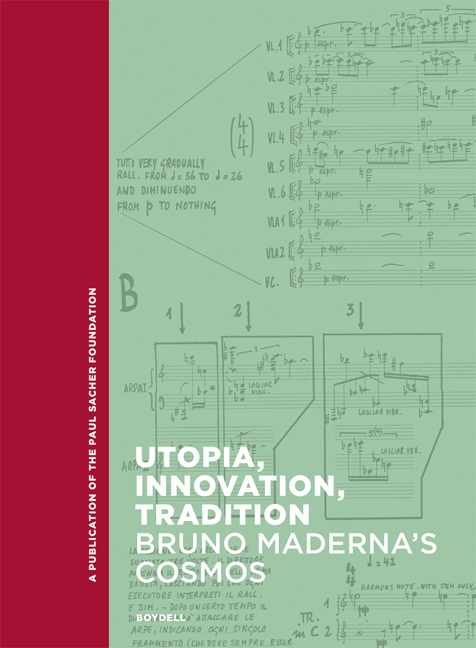Book contents
- Frontmatter
- Contents
- INTRODUCTION
- STAGING AND PERFORMING SOUNDS: A GLANCE THROUGH THE LAST THEATRICAL WORK
- BUILDING SOUNDS: THE COMPOSER
- CREATING SOUND: THE MUSIC BEYOND/WITHOUT THE STAGE
- REINVENTING SOUNDS: DIALOGUES WITH MUSIC OF EVERY EPOCH AND STYLE
- ACROSS BORDERS: THE CONDUCTOR AND THE INTERPRETER
- SEARCHING FOR ROOTS: THE DEVELOPMENT OF A STYLE
- STAGING AND PERFORMING TEXTS: A GLANCE THROUGH EARLY DRAMATURGICAL AND VOCAL WORKS
- Chronology Of Bruno Maderna’s Works
- Selected Bibliography
- Index
Maderna Goes to Tanglewood: The Role of American Networks in the Origins and Reception of Venetian Journal and Satyricon
Published online by Cambridge University Press: 17 January 2024
- Frontmatter
- Contents
- INTRODUCTION
- STAGING AND PERFORMING SOUNDS: A GLANCE THROUGH THE LAST THEATRICAL WORK
- BUILDING SOUNDS: THE COMPOSER
- CREATING SOUND: THE MUSIC BEYOND/WITHOUT THE STAGE
- REINVENTING SOUNDS: DIALOGUES WITH MUSIC OF EVERY EPOCH AND STYLE
- ACROSS BORDERS: THE CONDUCTOR AND THE INTERPRETER
- SEARCHING FOR ROOTS: THE DEVELOPMENT OF A STYLE
- STAGING AND PERFORMING TEXTS: A GLANCE THROUGH EARLY DRAMATURGICAL AND VOCAL WORKS
- Chronology Of Bruno Maderna’s Works
- Selected Bibliography
- Index
Summary
Bruno Maderna's extensive connections with the U.S. music scene have received much less attention than the American careers of many other European composers, for example Luciano Berio and Pierre Boulez. Yet Maderna spent a lot of time in the United States, where during the last few years of his life he gained increasing respect as a conductor and composer, working with top ensembles including the Chicago Symphony Orchestra, the Boston Symphony Orchestra, the Philadelphia Orchestra, and the New York Philharmonic.
As Maderna the conductor became better known in the U.S., Maderna the composer also received increasing recognition. Especially his late works, with their timbral richness and gestural expressivity, as well as their zany humor and high-energy theatricality, were eagerly received by many Americans as a welcome change from the increasingly academic new music culture in the U.S. At the same time, Maderna's use of controlled aleatoric techniques resonated with similar efforts by many American composers at the time, especially Earle Brown, with whom Maderna enjoyed a close friendship.
This essay will focus on the role of American patronage networks in the origins and reception of two works that Maderna composed within the last two years of his life. The monodrama Venetian Journal (1972), for solo tenor, instrumental ensemble, and tape, was commissioned and performed by the American tenor Paul Sperry, to a libretto by the American playwright Jonathan Levy. The opera Satyricon (1972–73), commissioned by the Netherlands Opera, was based on a multilingual libretto drawn in large part from an idiomatic American translation of the Latin text from the late first century by Petronius Arbiter, and staged by the young American director Ian Strasfogel, who had already worked with Berio in the U.S. The opera was preceded by a workshop experiment on the subject of “Trimalchio's Feast,” an episode in Petronius’ The Satyricon, scheduled within Strasfogel's Music Theater Project at Tanglewood during the summer of 1971. Maderna's opera received its American premiere in the summer of 1973 at Tanglewood, again staged by Strasfogel.
- Type
- Chapter
- Information
- Utopia, Innovation, TraditionBruno Maderna's Cosmos, pp. 299 - 328Publisher: Boydell & BrewerPrint publication year: 2023



